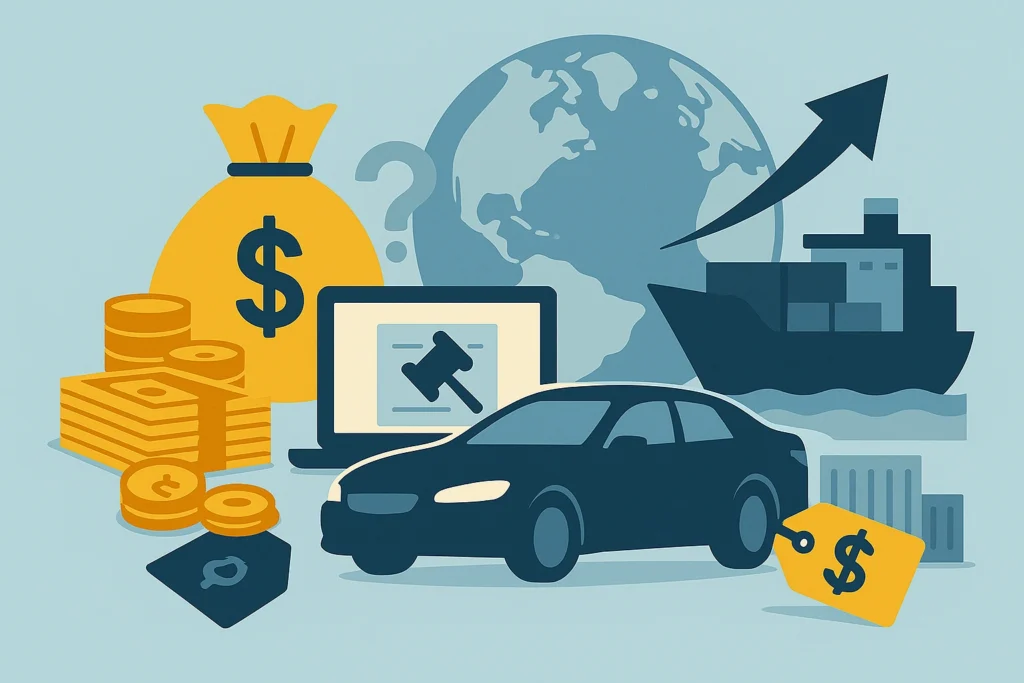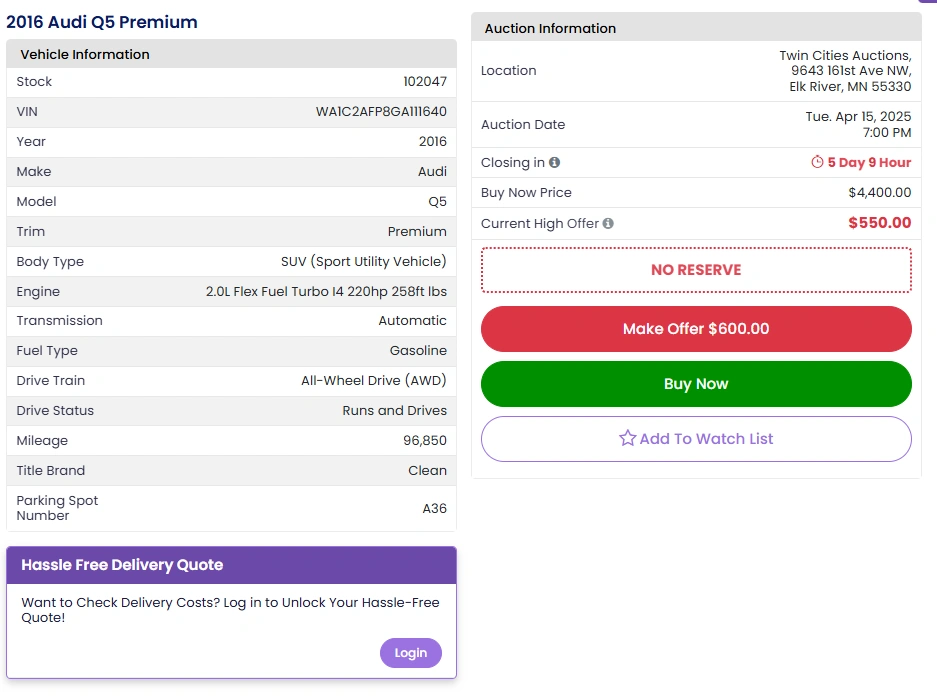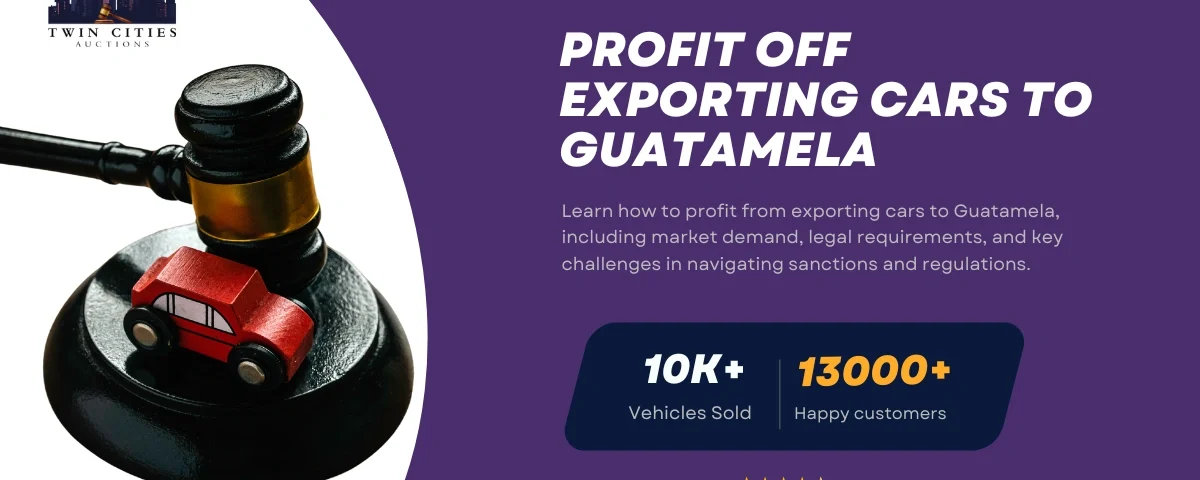Looking to tap a booming market for used cars? Imports in Guatemala jumped to $482 million in 2023, a 9.3 percent rise year over year. With an average CIF price of $7,850 per vehicle and duty structures that favor streamlined profitability, U.S. exporters can unlock significant gains.
This guide reveals how to navigate Guatemala’s regulations, master logistics, and maximize your margin.

Key Takeaways
- Import Growth: $482 M in 2023, up 9.3 % vs 2022
- Unit Economics: $7 850 average CIF price per car
- Required Documents: Invoice, Customs Declaration, Bill of Lading, Conformity & Emissions Certificates
- Levies: 10 % duty; 15–100 % ISC; 12 % VAT; 2 % processing fee
- Cost Modeling: Layer each charge onto your CIF base
- Port Gateways: Santo Tomás de Castilla (Caribbean) and Puerto Quetzal (Pacific)
Understanding the Guatemalan Market
Guatemala’s expanding middle class and aging local fleet drive a preference for younger, well-maintained imports. Economic growth, urban congestion, and limited domestic production keep demand strong year-round. Recent growth reflects both replacement of older vehicles and increased purchasing power in urban centers like Guatemala City and Quetzaltenango.
| Year | Import Value (USD M) | YoY Change |
| 2022 | 441 | — |
| 2023 | 482 | + 9.3 % |
| Metric | Figure |
| Avg. CIF Price per Vehicle | $7 850 per unit |
Regulations & Compliance
Imports under HS 8703 must clear Guatemala’s Superintendencia de Administración Tributaria (SAT) and meet Ministry of Finance (MINFIN) standards. Vehicles undergo emissions testing and a conformity review to ensure safety and environmental compliance. Common compliance steps:
- Document Preparation: Ensure invoices and declarations accurately reflect vehicle value, VIN, and specs.
- Emissions Testing: Conducted at SAT-approved facilities; certificate required for clearance.
- Conformity Certificate: Issued by authorized labs verifying adherence to Guatemalan norms (e.g. ABS, airbags).
- Customs Presentation: Submit pedimento, invoices, test certificates, and surveyor reports via SAT’s electronic portal.
| Document | Purpose | Timing |
| Commercial Invoice | Declares price and transaction parties | Immediate |
| Customs Declaration (Pedimento) | Registers import and calculates duties/VAT | Immediate |
| Bill of Lading | Verifies shipment and vessel information | Immediate |
| Emission Test Report | Confirms compliance with environmental limits | 1–3 days |
| Certificate of Conformity | Validates safety and technical compliance | 1–5 days |
Sources: SAT
Tariffs & Taxes
Guatemala’s layered levy system requires precise calculation at the CIF base:
| Levy | Rate | Base |
| Customs Duty | 10 % | CIF |
| Selective Consumption Tax (ISC) | 15–100 % | (CIF + Duty) based on age/engine size |
| Value-Added Tax (VAT) | 12 % | (CIF + Duty + ISC) |
| Customs Processing Fee | 2 % | CIF |
Source: Guatemala Customs Tariff Law
Crafting Your Landed-Cost Model
To preserve margins, layer each levy as follows and then add your target markup:
| Component | Calculation |
| CIF Cost | FOB + Freight & Insurance |
| Customs Duty (10 %) | 0.10 × CIF |
| ISC (15–100 %) | 0.15–1.00 × (CIF + Duty) |
| VAT (12 %) | 0.12 × (CIF + Duty + ISC) |
| Processing Fee (2 %) | 0.02 × CIF |
Aim for a 10–15 % markup on the total landed cost to cover currency swings, inland transport, and dealer fees.
Main Shipping Gateways
- Santo Tomás de Castilla (Caribbean): Principal gateway for most imports.
- Puerto Quetzal (Pacific): Offers Ro-Ro and container services with competitive rates.
(Confirm vessel schedules and inland trucking options with your freight forwarder.)
Common Pitfalls to Avoid
Even experienced exporters can face costly delays or penalties due to overlooked compliance details. From tax miscalculations to missing documentation and non-standard safety features, these common pitfalls can disrupt the entire import process.
Being proactive and thorough in preparation is key to ensuring smooth customs clearance and maximizing profits.
| Common Pitfall | Description |
|---|---|
| Mis-calculating ISC | Rates vary widely by vehicle age and engine displacement, leading to unexpected import costs. |
| Incomplete Testing | Missing or invalid emission or conformity documents can result in customs delays or rejection. |
| Documentation Errors | Inconsistencies between the invoice, pedimento, and packing list may trigger fines or audits. |
| Ignoring Local Standards | Vehicles lacking mandatory safety features (e.g., ABS) may be denied clearance by customs. |
Why Auctions Are a Smart Choice for Car Purchases
Auctions can be an excellent source for late-model vehicles with clear chains of title and affordable pricing. Twin Cities Auctions, based in Minnesota, is one such reputable auction house that offers a wide range of vehicles at competitive prices.
Key Benefits of Buying from Auctions:
- Wide Selection: Auctions like Twin Cities Auctions offer a variety of vehicles, from low-budget cars to high-end models.

- Competitive Pricing: Auctions often offer vehicles at prices below retail value, enabling dealers to maximize their profit margins.

- Transparency: Auctions provide full vehicle history reports, so you know exactly what you’re buying.

- Convenient Bidding: Many auctions offer online bidding for your convenience, making it easier to source vehicles without being physically present.
Twin Cities Auctions: A Smart Vehicle Sourcing Choice
For those in the automotive industry, Twin Cities Auctions offers an excellent platform for sourcing quality vehicles at competitive prices.
Whether you are just starting or expanding your business, this auction house provides transparency, competitive pricing, and a broad selection.
| Feature | Description |
| Inventory Variety | Wide range of cars, trucks, and SUVs available |
| Competitive Pricing | Below-market pricing allows for higher profit margins |
| Vehicle History Reports | Detailed history reports for every vehicle |
| Online Bidding | Convenient online bidding options for dealers |
| Financing Options | Financing available to help with inventory purchases |
Conclusion
Master Guatemala’s levy structure, customs duty, ISC, VAT and processing fees, to accurately calculate landed costs and protect your margins. Complete all required emissions tests and conformity certifications to speed customs clearance.
Choose the best port gateway and transit schedule to reduce inland haul expenses. Source your cars from U.S. auctions for reliable, export‑ready inventory. Use these proven tactics to claim your share of Guatemala’s $482 million used‑car market and boost your profits now.
Your Next Car is Just a Click Away at Twin Cities Auctions!
Twin Cities Auctions brings the excitement of car auctions directly to your screen. No dealer license? No problem! Our online platform is open to the public, offering a wide range of vehicles to suit all tastes and budgets.
Whether you are an automotive enthusiast or a first-time buyer, you’ll find an impressive variety of vehicles that cater to all tastes and budgets. From reliable family sedans and eco-friendly hybrids to high-performance cars and premium SUVs, our listings are curated to ensure quality and diversity.
Enjoy a hassle-free bidding process and secure your perfect match from our extensive lineup. Don’t miss out—your next car is just a click away at Twin Cities Auctions!
Looking for more options? Explore our comprehensive list of all available car auctions across the United States. Your next deal might be just a click away!
FAQ
What are Guatemala’s auto import duties?
10 % Customs Duty; 15–100 % ISC; 12 % VAT; 2 % processing fee—applied to CIF.
Can I export used cars to Guatemala?
Yes; used vehicles of any age may enter but incur higher ISC based on age and engine size.
How long is customs clearance?
Typically 1–5 business days after document and test submission.
Are there safety standards?
Yes; KEBS-style conformity checks ensure vehicles meet local safety and emissions requirements.
How do I resolve customs holds?
Work with a local customs broker to rectify documentation and arrange retests; budget for storage fees.
Source Links
https://www.indexbox.io/search/passenger-car-price-guatemala
https://www.sat.gob.gt/ErpEmbarques/InfoWeb/Pedimentos.aspx


